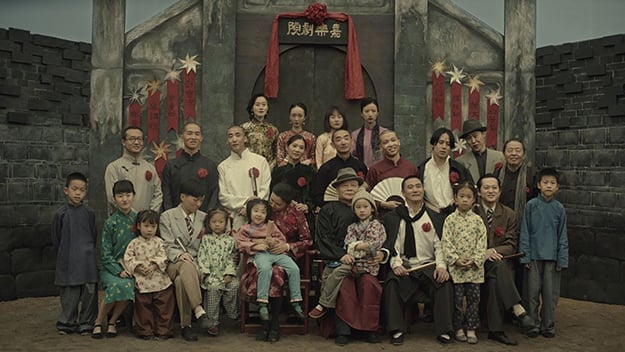The World’s a Stage
This article appeared in the June 23, 2022 edition of The Film Comment Letter, our free weekly newsletter featuring original film criticism and writing. Sign up for the Letter here.

A New Old Play (Qiu Jiongjiong, 2021)
Running just shy of three hours, A New Old Play opens in the 1920s and traces over half a century of Chinese history through the fortunes of Qiu Fu (Yi Sicheng), the lead clown-actor of a Sichuan opera troupe. Accordingly, the film—Qiu Jiongjiong’s first fiction feature—is one of enormous ruptures, stepping through such epochal markers as the Great Leap Forward and the Cultural Revolution, with its characters bearing witness to many bombastic declarations of the new. But the film is also, equally, a story of continuities, exploring our relationship to cultural traditions and conventions, especially in art. As one of the film’s title cards reminds us, “A new play always tells an ancient tale.” On the one hand, then, A New Old Play is a portrait of the artist as a historical being, subject to all the contingencies of material existence; on the other, it is a film about those ancient tales which transcend the limitations of any individual person—those stories which never seem to go away, despite all attempts to eradicate them, and which come alive, recreated, in the telling.
When the film begins, however, the artist is already dead. First introduced wandering through a fog-shrouded village, an elderly Qiu Fu runs into a pair of strange figures whom he eventually recognizes as Ox-Head and Horse-Face, two deities of Chinese folklore responsible for ushering people into the underworld. Bearing an invitation from the King of Hell, they are there to escort Qiu to Fengdu, the Ghost City, where spirits pass into their next reincarnations. He has no choice but to accompany them. From here, A New Old Play mostly alternates between this netherworld passage and scenes from Qiu’s former life, beginning with his entrance into the New-New Theater and Opera School in Sichuan at only 7 years old. (He’s played at this age by Chen Haoyu.) Although initially something of a nuisance, he quickly becomes a star actor of the troupe, and a personal favorite of its founder Pocky (Qiu Zhimin), a soldier and an avowed opera fan.
Broadly, A New Old Play, the recipient of the Special Jury Prize at last year’s Locarno Film Festival, might bring to mind Jia Zhangke’s Platform (2000), which likewise charts a vast swath of Chinese history from the perspective of a small theater troupe. But in terms of style, Qiu Jiongjiong entirely forgoes Jia’s realist tendencies, choosing instead to engage with the visual vernacular of Sichuan opera. The film unfolds in elaborate theatrical tableaux, featuring frontal compositions and planimetric frames dense with activity. For instance, a scene of Chinese Civil War soldiers carrying their wounded comrades plays out in a diorama-like soundstage, with human figures flattened into silhouettes; and when the New-New troupe temporarily escapes to Taiwan following the conflict, their journey is conveyed by the movements of a boat swaying amid rippling blue fabric. Even scenes in the underworld are presented with the same playful artifice as those above ground. The enchantment of Qiu’s inventive historical recreation thus lies not in exhaustive portraiture but in selective detail, relying on the viewer’s power of imaginative projection.
Across its epic runtime, A New Old Play includes a few crucial gestures to artistic and cultural developments beyond the Sichuan opera scene. A slideshow lecture on the ills of opium, presented during a session for addicted performers, obliquely nods toward the magic-lantern shows of early cinema; a sepia-toned point-of-view shot from a camera panning silently across a courtyard evokes the aesthetic limitations of pre-sound cinema; and the appearance of a smuggled text detailing Stanislavski’s “system” points to acting techniques far removed from the conventions of Sichuan opera. Even as Qiu Fu and his fellow players contend with the pressures of Communist censorship and charges of anti-revolutionary activity, not to mention widespread famine and personal tragedy, we also see them face up to the encroaching obsolescence of their artistic practice.
“It’s only now, since I’m dead, that I see the play’s not over when the curtain falls,” Qiu Fu remarks to one of his underworld companions as they move closer to Fengdu. More than just an affirmation of the afterlife, the line emphasizes the central tension of A New Old Play: the idea that all changes in society, whether revolutionary or reactionary, must eventually establish some continuity with the past. (We see this not just in the film’s mélange of stylistic forms, but also in the generational conflict that emerges toward the end, centered around Qiu’s son.) In its closing movement, the only lingering question is whether or not Qiu will drink the Soup of Oblivion, which will wipe the memories of his past life to prepare him for reincarnation into the next. In other words, his final confrontation is not with dying, but with forgetting—that great fear of every actor, and an ever-present threat to a nation’s culture. The implication is that a play is only really over when there is no one left who can recite the lines. In a world filled with those who would have us forget the past and look only to their vision of the future, A New Old Play attests that one role of serious art is to help us remember.
Lawrence Garcia is a freelance film critic. He is currently pursuing a master’s degree at York University.







